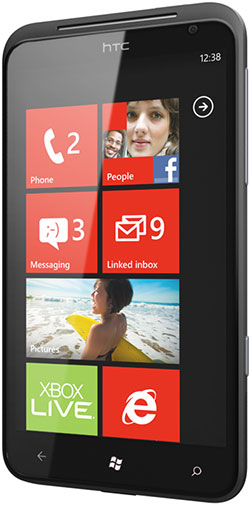 Carol Bartz has been fired from her role as CEO of Yahoo, but the company itself remains face-to-face with an identity crisis. Its collection of Web properties is large and in some cases well-loved, but the pieces rarely fit together as well as those of rivals like Google. Meanwhile, AT&T mulls its options, Groupon thinks long and hard about its IPO, and a judge adds a new chapter to the Oracle-SAP feud.
Carol Bartz has been fired from her role as CEO of Yahoo, but the company itself remains face-to-face with an identity crisis. Its collection of Web properties is large and in some cases well-loved, but the pieces rarely fit together as well as those of rivals like Google. Meanwhile, AT&T mulls its options, Groupon thinks long and hard about its IPO, and a judge adds a new chapter to the Oracle-SAP feud.When the end of her stint as Yahoo (Nasdaq: YHOO) CEO came for Carol Bartz, it arrived via a phone call from the company's chairman. That's what she told employees in a profanity-free, company-wide email when she learned the news.
Bartz was fired after nearly three years as Yahoo's chief executive, having failed to turn around the once-great Internet company, which has been declining for years while rivals like Google (Nasdaq: GOOG) have been on a decade-long tear.
Following a string of ineffective leaders and a nasty fight with Microsoft (Nasdaq: MSFT) that almost resulted in a hostile takeover, Yahoo signed on Bartz to revive the company's revenue stream. Months after taking office back in January of 2009, she landed a search engine deal with Microsoft. It was a much smaller deal than the wholesale buyout Microsoft had been gunning for the previous year, and even though it promised long-term benefits for Yahoo, it initially made shareholders gag.
Since then, the company's had an AOL-like identity crisis. Yahoo's still a giant email provider, it owns some popular sites like Flickr, and it's still a contender in search market share, even though Bing seems to be edging it out lately. But over the past few years, Yahoo has looked sluggish and unwilling to take risks. Its deals and maneuvers just don't seem to make much noise at all, whereas competitors like Google have been busy building new online services -- and even entire operating systems in major growth areas like smartphones.
Google's lately proven it's very comfortable slaughtering its own innovations, but at least it's making them in the first place.
Listen to the podcast (11:38 minutes).
That's not to say Bartz's inability to restore Yahoo's youthful vigor in less than three years necessarily makes her a particularly bad CEO. Even the company's cofounder, Jerry Yang, who served as CEO immediately before Bartz, couldn't get much going in his time behind the wheel. Same with the guy before that, Terry Semel. Bartz didn't blow an easy job; she was just the most recent in a chain of CEOs who couldn't get the company's broad mishmash of properties and services to align into something exciting and innovative.
Now, Yahoo's board is reportedly looking into all options -- buy, sell, partner or even a combination of all three. Maybe lop off the search arm and sell it to Microsoft completely? Or maybe it can do something with that 40 percent of Alibaba it owns.
Yahoo CFO Tim Morse will take the wheel as interim CEO, but whoever Yahoo hires as a full-time replacement might need to be a little crazy. This person may need to make some kind of extraordinary cut, or a huge acquisition. There could be a lot of lost jobs, spent money and huge fights with the board and shareholders before anything remarkable happens with Yahoo.
And "remarkable" doesn't necessary mean "good," either. Whoever's next in line could stand out only for guiding Yahoo into a failure the likes of which we've never seen before. Or not. Maybe there's a rare visionary out there whose gamble will pay off. But the alternative -- to just keep walking and breathing and blinking while the rest of the Internet world speeds on by and crashes and burns and sometimes takes off into sky -- that sounds like it could be the strategy most likely make Yahoo fade into nothing.
One at Your Door ...
AT&T (NYSE: T) still thinks it has a shot at saving its proposed deal to buy out rival wireless carrier T-Mobile, despite the lawsuit the U.S. Department of Justice has filed to prevent the merger on antitrust grounds.
And even though that suit apparently took AT&T totally by surprise, the DoJ isn't completely hell-bent on stopping the deal cold -- maybe. At a news conference, a DoJ official remarked that the department's door is open, and that there's a possibility its concerns can be resolved. So maybe a settlement can be reached.
So what can AT&T do to keep the dream alive? Well, many of the DoJ's concerns have to do with consumer choice and pricing for wireless services. T-Mobile sometimes offers lower-priced plans than AT&T or its other big rival, Verizon, so perhaps AT&T can promise to keep the brand's price points intact for a certain amount of time.
Or it could promise to offload some T-Mobile stock.
Or get the public on its side -- figure out a way to convince consumers that a combined AT&T and T-Mobile would make for a happier, shinier world with better wireless prices and greater investment in services. It might even dust off that job-creation angle it was trying to stir up last week, though that one might be a little counterproductive. Telling the world that a merger of two gigantic companies will result in a net increase in jobs tends to nauseate anyone who's ever been laid off following a buyout.
Or AT&T could just go for the bloodbath and fight out the DoJ's lawsuit in court. That might cost a lot of time and pain, but a victory would mean the deal would go down AT&T's way, with no uncomfortable compromises. And even though DoJ has a valid case against the buyout, it's by no means an easy win.
... and Another Around the Corner
If AT&T somehow manages to solve its DoJ problem, one way or another, it's still going to have to deal with another lawsuit, this one filed by rival carrier Sprint (NYSE: S).
Sprint's lawsuit articulates most of the same arguments the company's been talking about ever since the deal was announced: higher prices, duopoly, harm to other carriers and so on.
Sprint's in a particularly uncomfortable situation right now with the possibility of this merger hanging over its head, and it seems it felt the urge to hedge its bets in case AT&T should win or settle the DoJ suit.
If the deal goes through, AT&T is the big winner, T-Mobile more or less ceases to exist, and Verizon loses its position as the biggest carrier in the U.S. but probably doesn't feel very much pain.
Sprint's the one that will feel the pinch. It's tiny compared to the top two rivals now, and it'll be even tinier if one of them swallows a competitor. Sprint's argument is that AT&T's move would be like an elephant, a rhinoceros and a chihuahua trying to share a studio apartment.
On Second Thought ...
Last Spring, when companies like LinkedIn and Pandora were pulling the trigger on their IPOs, there was a lot of talk about who was going to be next. Social game-maker Zynga is on the road to public trading already, and for a while there was some very excited talk about Twitter and eventually Facebook.
Groupon wasn't left out of the conversation either, especially since it had the sass to turn down Google's offer to buy it out for $6 billion late last year.
Sure enough, Groupon filed with the U.S. Securities and Exchange Commission for an initial public offering, but what's happened since then has reportedly caused Groupon to reconsider whether it really wants to jump into the public realm right now.
First of all, the market's been seriously shaken over the last few weeks. For a while, problems in Europe and the U.S. debt ceiling showdown sent Wall Street into an almost daily cycle of boom and bust. It's calmed down now, but nerves are still frayed, and some potential investors may feel it's not an ideal time to bring a new public company into the world.
Secondly, Groupon's own actions have caused some anxiety as well. It's reportedly struggled with the SEC over the method of accounting it used when filing its S1 statement, a document companies need to hand over to the commission when they're prepping to go public.
Then there was the matter of the memo Groupon CEO Andrew Mason wrote to his employees over some of the flack the company's taken lately. He expressed in great detail all the reasons he's very confident in Groupon's success. Officially, the memo was intended only for Groupon's employees, which doesn't violate the obligatory quiet period companies must undergo before they go public. During that time, a company's highly restricted in what it can publicly state. Mason's memo would have been a direct violation of that rule, except for the fact that it was only sent to Groupon employees. Of course, the reason everyone knows about it is because AllThingsD published it after it was leaked ... somehow.
That letter was actually written in response to some pretty biting criticism of Groupon's business model, which the company's endured for a long time, but even more so since it announced its intentions to go public. The basis for that criticism still stands, and that may be one of the biggest factors contributing to Groupon's reported IPO delay.
Specifically, Groupon's business is really easy to copy. It doesn't take a great deal of resources to launch your own online coupon company, and already competitors are coming out of the woodwork. Living Social has been around for a relatively long time, Facebook does it, Amazon (Nasdaq: AMZN) does it, and Google whipped up something of its own just months after Groupon turned it down. Some focus entirely on one town, some are all about a specific kind of product. Groupon's more general, it has wide reach and a certain amount of brand recognition -- but without profits or a unique approach to the business, going public right now might end in disaster.
Shall We Go Another Round?
The bad blood between Oracle (Nasdaq: ORCL) and SAP (NYSE: SAP) just got badder, if such a thing were possible. A judge has overturned the record $1.3 billion penalty that SAP was ordered to pay Oracle last year. At the time, it was the largest amount of damages ever awarded to a plaintiff in a single copyright case.
SAP is still considered guilty of copyright infringement for its little TomorrowNow fiasco -- it's already admitted to wrongdoing in court. But Judge Phyllis Hamilton ruled that there's no way Oracle suffered $1.3 billion worth of pain due to the SAP subsidiary's theft. She knocked the amount SAP must pay all the way down to the much more manageable sum of $272 million. That's still a big chunk of money, but it no doubt comes as a relief to SAP.
The Oracle and SAP family feud goes way back, and the trial that initially led to that $1.3 billion penalty was a bitter and tense ordeal. HP (NYSE: HPQ) was even pulled into the mess when Oracle insisted that HP's newly installed CEO, Leo Apotheker, should take the stand and testify about the TomorrowNow incident, considering he was once the head of SAP. But Apotheker was apparently nowhere to be found. He was in hiding, which is an odd place to be for a guy who was just named captain of one of the biggest hardware makers in the world.
Incidentally, Apotheker came to HP to replace Mark Hurd, who'd been squeezed out following a scandal involving a female contractor and bogus expense claims. Just as soon as he was out, though, Hurd found employment in the open arms of Oracle.
Despite the judge's billion-dollar reduction in SAP's penalty, Oracle doesn't have to take the judgment lying down. If it thinks it's owed more than the new $272 million figure, it can take SAP to trial again, and there's a good chance it'll go ahead and do just that. It's already established that SAP's defunct TomorrowNow division did something wrong, and it could come back with a more detailed explanation of how much it suffered.
Also, Oracle just seems to get a kick out of causing misery for SAP whenever possible.





 Even if you don't know what they are, you probably see a few QR codes every time you leave home. They're those pixelated boxes that look like overgrown bar codes, and with the right reader -- typically a smartphone app -- they can take to you websites, send you messages, or just clue you in on your surroundings. There are lots of QR readers for iPhone out there, but one of the better of the bunch is called "Scan."
Even if you don't know what they are, you probably see a few QR codes every time you leave home. They're those pixelated boxes that look like overgrown bar codes, and with the right reader -- typically a smartphone app -- they can take to you websites, send you messages, or just clue you in on your surroundings. There are lots of QR readers for iPhone out there, but one of the better of the bunch is called "Scan."
 "Cause for concern? Yes, but there's no reason to believe that kernel sources were compromised; such a change would be easily detected with diff," said Hyperlogos blogger Martin Espinoza. "I'd sure like someone to show me a 100 percent secure, internet-connected computer... ."
"Cause for concern? Yes, but there's no reason to believe that kernel sources were compromised; such a change would be easily detected with diff," said Hyperlogos blogger Martin Espinoza. "I'd sure like someone to show me a 100 percent secure, internet-connected computer... ." Passion is infectious. Passion drives folks like Jobs and Gates to ensure the product is successful. Passion overwhelms the desire to overfocus on containing budgets, and it guarantees that enough resources are provided to make success almost a foregone conclusion. Ballmer is clearly not a tech toy or PC guy; it isn't even clear if anyone at Yahoo, let alone Bartz, really knows what Yahoo's product is.
Passion is infectious. Passion drives folks like Jobs and Gates to ensure the product is successful. Passion overwhelms the desire to overfocus on containing budgets, and it guarantees that enough resources are provided to make success almost a foregone conclusion. Ballmer is clearly not a tech toy or PC guy; it isn't even clear if anyone at Yahoo, let alone Bartz, really knows what Yahoo's product is.
 As written, the bill H.R. 1981 aims to stamp out child pornography with new penalties and enforcement powers. So how can anyone in their right mind oppose it? Civil liberties and privacy rights groups, however, say the bill's provisions go much too far in tracking and storing information about all Internet users. They also say child porn traders will respond to the law by simply using public WiFi networks.
As written, the bill H.R. 1981 aims to stamp out child pornography with new penalties and enforcement powers. So how can anyone in their right mind oppose it? Civil liberties and privacy rights groups, however, say the bill's provisions go much too far in tracking and storing information about all Internet users. They also say child porn traders will respond to the law by simply using public WiFi networks. Microsoft's Windows Phone operating system barely has a toehold in the smartphone market, but AT&T is moving to change that with the announcement of three new handsets running the latest WinPho version, dubbed "Mango," as well as upgrades to Mango for existing WinPho devices. That might just keep Windows Phone on the radar until Nokia unleashes its expected slew of new products.
Microsoft's Windows Phone operating system barely has a toehold in the smartphone market, but AT&T is moving to change that with the announcement of three new handsets running the latest WinPho version, dubbed "Mango," as well as upgrades to Mango for existing WinPho devices. That might just keep Windows Phone on the radar until Nokia unleashes its expected slew of new products.
